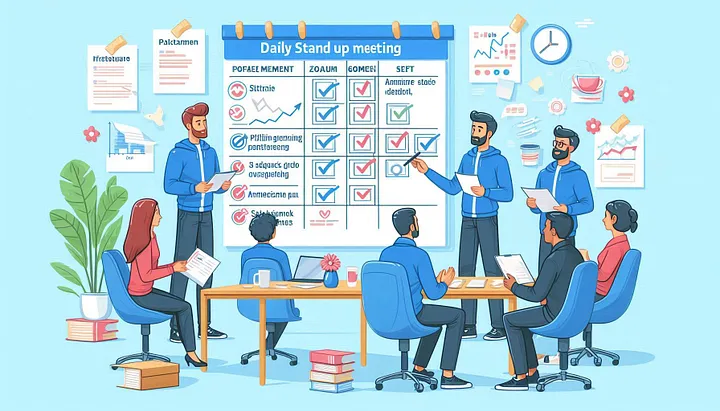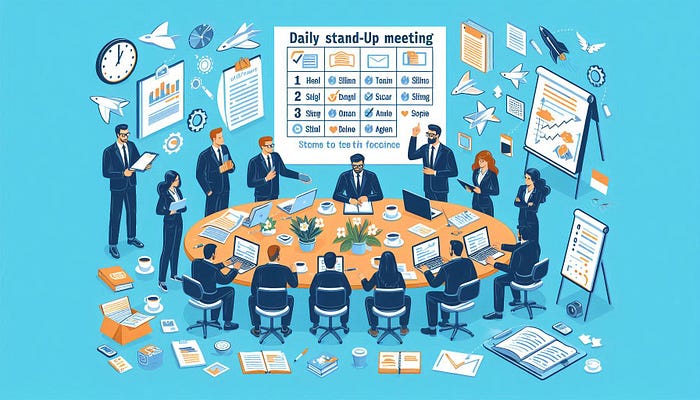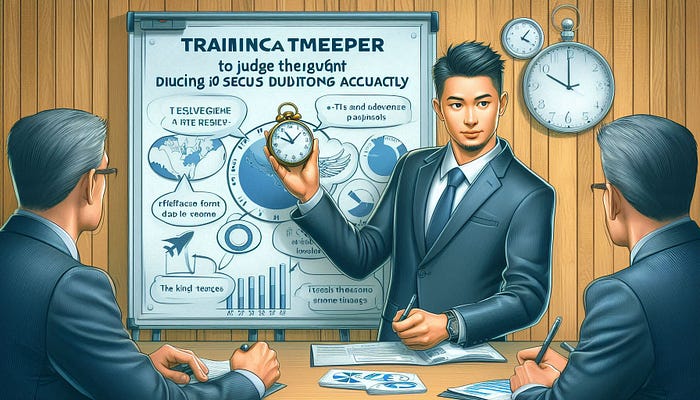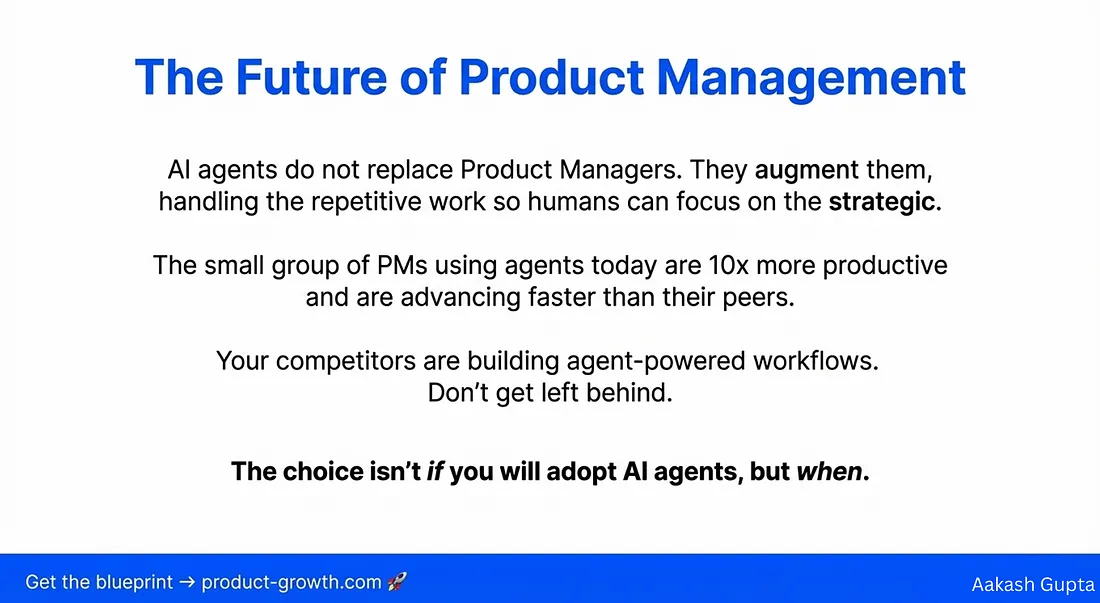
Agile: Daily Stand-Up Meeting Agenda
Daily stand-up meetings are a routine and a cornerstone of agile project management. They are designed to align teams, identify and resolve blockers quickly, and ensure continuous progress toward project goals. These meetings, also known as daily scrums, are not just short, focused sessions where team members provide updates on their work and discuss any impediments they face. They are the heartbeat of our agile project management process. This article will cover all the critical points for creating a compelling daily stand-up meeting agenda, strategies to keep the meeting brief and focused, potential challenges in implementing a timekeeper role, and training a timekeeper to judge the relevance of discussions accurately.
Agile: Daily Stand-Up Meeting Agenda
A well-structured daily stand-up meeting agenda ensures quick resolution of blockers and effective communication among team members. Here is a suggested agenda:

1. Opening and Purpose (1 minute)
— Briefly state the purpose of the meeting: to provide status updates, identify blockers, and ensure team alignment.
2. Progress Updates (5–7 minutes)
— Each team member answers the following questions:
— What did I accomplish yesterday?
— What will I work on today?
— Are there any blockers or impediments in my way?
3. Blockers and Impediments (3–5 minutes)
— Identify and discuss any blockers or impediments that were mentioned.
— Assign someone to follow up on each blocker after the meeting if it cannot be resolved immediately.
4. Coordination and Collaboration (2–3 minutes)
— Discuss any tasks that require coordination between team members.
— Identify opportunities for team members to assist each other.
5. Announcements and Reminders (1–2 minutes)
— Share any important announcements or reminders relevant to the team.
6. Closing and Next Steps (1 minute)
— Summarize key takeaways and action items.
— Confirm the time and place for the next stand-up meeting.
Agile: Strategies to Keep the Daily Stand-Up Meeting Brief and Focused

Strategies to Keep the Daily Stand-Up Meeting Brief
Keeping daily stand-up meetings brief and focused is essential for maintaining productivity and ensuring smooth meetings. Here are some strategies to achieve this:
- Create a Meeting Agenda:
— Develop a clear agenda that outlines the items to be covered and the duration for each item.
— Distribute the agenda via email to all attendees before the meeting.
- Appoint a Timekeeper:
— Assign a team member to be the timekeeper to ensure the meeting stays on schedule.
— The timekeeper can gently remind participants to stay on topic and propose taking unrelated discussions offline.
- Stand Up During the Meeting:
— Encourage participants to physically stand up during the meeting to maintain a sense of urgency and focus.
— Standing helps keep the meeting short and ensures that everyone remains engaged.
- Limit Discussions to Status Updates:
— Focus on brief status updates rather than deep troubleshooting or problem-solving.
— Remind participants that detailed discussions should be taken offline and handled after the meeting.
- Use Visual Aids:
— Post critical project information on the walls, such as schedules, problem logs, and risk registers, to keep everyone informed and focused.
— For virtual teams, share these documents on a shared screen or platform.
- Set Clear Expectations:
— Clearly explain the purpose of the stand-up meetings and what is expected from each team member.
— Emphasize the importance of staying on topic and keeping updates concise.
Agile: Potential Challenges in Implementing a Timekeeper Role

Potential Challenges in Implementing a Timekeeper Role Implementing a timekeeper
Implementing a timekeeper role in daily stand-up meetings can be beneficial for keeping the meeting on track, but it also comes with potential challenges. Here are some of the challenges that might arise:
- Resistance from Team Members:
— Some team members may need help with having a timekeeper, feeling that it adds unnecessary pressure or formality to the meeting.
— There might be a perception that the timekeeper’s role is policing the meeting, which could lead to discomfort or tension.
- Difficulty in Judging Relevance:
— The timekeeper needs to have enough experience and understanding of the project to judge the discussions’ relevance accurately.
Inexperienced timekeepers might need help determining which topics should be taken offline, potentially overlooking essential issues.
- Balancing Firmness and Flexibility:
The timekeeper must balance being firm enough to keep the meeting on track and flexible enough to allow necessary discussions.
— Being too strict can stifle essential conversations, while being too lenient can lead to meetings running over time.
- Potential for Conflict:
— The timekeeper role can sometimes lead to conflicts if team members feel they are being cut off or rushed.
— Good interpersonal skills are required to manage the role without causing friction among team members.
- Consistency in Role Execution:
— Ensuring consistency in executing the timekeeper role can be challenging, mainly if the role rotates among different team members.
— Different individuals may have varying levels of effectiveness and comfort in managing their period.
Agile: Training a Timekeeper to Judge the Relevance of Discussions Accurately

Training a timekeeper to judge the relevance of discussions during stand-up meetings accurately involves several key steps. Here are some strategies to ensure the timekeeper is well-prepared for their role:
- Provide Clear Guidelines:
— Establish clear criteria for what constitutes relevant and irrelevant discussions.
— Share examples of typical relevant topics (e.g., progress updates, blockers) and irrelevant topics (e.g., detailed problem-solving, off-topic conversations).
- Role-Specific Training:
— Offer specific training sessions focused on the timekeeper role, including best practices for managing time and keeping discussions on track.
— Use role-playing exercises to simulate stand-up meetings and practice identifying and addressing off-topic discussions.
- Mentorship and Shadowing:
— Pair the new timekeeper with an experienced team member who can mentor them and provide feedback.
— Allow the timekeeper to shadow the mentor during stand-up meetings to observe how they handle the role.
- Regular Feedback:
— Encourage the timekeeper to seek feedback from the team after each meeting.
— Conduct periodic reviews to discuss what is working well and areas for improvement.
- Understanding Project Context:
— Ensure the timekeeper understands the project’s goals, priorities, and current status.
— Provide access to project documentation, such as schedules, risk registers, and issue logs, to help them make informed decisions.
- Communication Skills:
— Train the timekeeper in effective communication techniques, including politely redirecting off-topic discussions.
— Emphasize the importance of being assertive yet respectful to maintain a positive team dynamic.
Agile: Examples of Typical Relevant Topics During Stand-Up Meetings

Examples of Typical Relevant Topics During Stand-Up Meetings
Typical relevant topics during stand-up meetings help the team stay aligned, identify and resolve issues quickly, and ensure progress toward project goals. Here are some examples:
- Progress Updates:
— What has each team member accomplished since the last meeting?
— Current status of tasks and deliverables.
— Any milestones reached or significant progress made.
- Plans for the Day:
— What does each team member plan to work on today?
— Prioritization
Daily stand-up meetings are a vital component of agile project management. They ensure that teams remain aligned, blockers are identified and resolved quickly, and progress toward project goals is maintained. A well-structured agenda, including progress updates, plans for the day, blockers, coordination, and announcements, helps keep the meeting focused and productive. Implementing strategies such as appointing a timekeeper, standing during the meeting, and setting clear expectations can further enhance the effectiveness of these meetings.
However, challenges such as resistance from team members, difficulty in judging relevance, and potential conflicts must be addressed. Training the timekeeper with clear guidelines, role-specific training, mentorship, and practical communication skills are essential for their success. By focusing on relevant topics and maintaining a disciplined approach, teams can maximize the benefits of daily stand-up meetings, ensuring continuous progress and effective communication.








Comments ...
No Comments Yet ...Add One